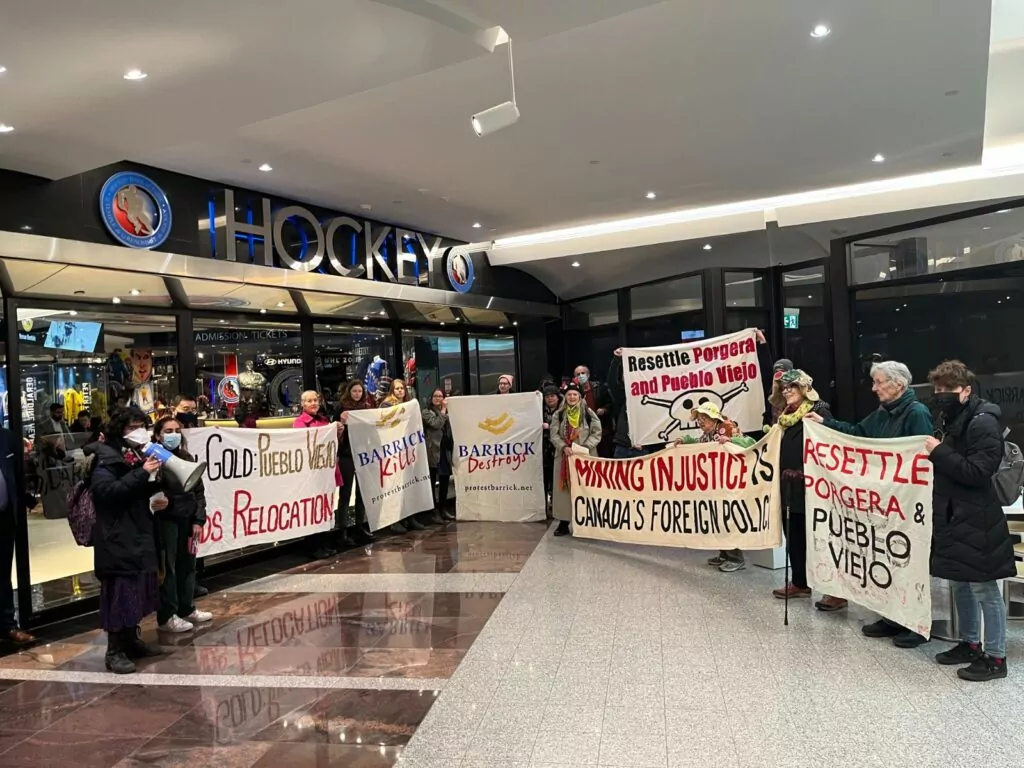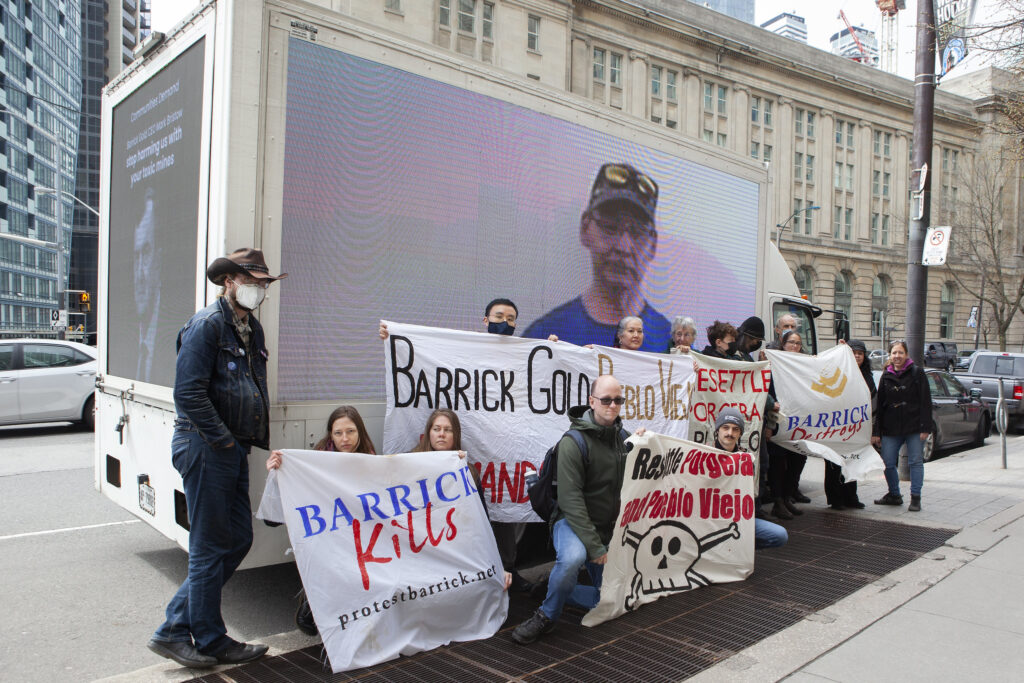Coauthors:
Jan Morrill, Earthworks
Catherine Coumans, MiningWatch Canada
From Alaska to Papua New Guinea, communities were paying close attention to Barrick Gold’s annual shareholders meeting on May 2 in Toronto.
The meeting came after seven communities affected by Barrick mines launched a Global Week of Action calling out the gap between Barrick’s supposed human rights commitments and its track record on the ground. They presented cases of oppressive violence, perpetual water pollution, violations of Indigenous Rights, and destroyed livelihoods. With protests and actions in the Dominican Republic, Argentina, Papua New Guinea, Nevada and Alaska, they called Barrick’s social license to operate into question.

As shareholders gathered inside, protesters gathered outside. They were flanked by a mobile billboard with direct pleas from communities asking Barrick to stop harming their lives and livelihoods, including a powerful statement from Anaan’arar, Sophie Irene Swope, of the Mother KuskokwimTribal Coalition: “We have a very important message for you Barrick Gold: You do not have a social license and you should not continue to develop any of our lands.” Watch the full video here.
Inside, things got ugly. Lateef Johar, a human rights activist from the Balochistan region of Pakistan, told Barrick he had lost family, friends, and colleagues at the hands of the Pakistani government’s security forces. He questioned Barrick’s agreements with the regional Pakistani government that approved Barrick’s mine and said the company did not have consent from the surrounding communities. CEO Mark Bristow’s ad hominem response was disrespectful and racist.
“I understand that you are a person seeking asylum in Canada,” he said. “And I think the key critical thing here is that it has been a long time since you have been back in Pakistan. You are from Gwadar but there are a whole lot of things that you don’t understand about our project in Pakistan.” When Johar pushed back and the exchange got heated, Bristow told him to take his problems to the Pakistani Supreme Court, had him kicked out of the meeting and ended by saying, “You should go back to Balochistan.”
Johar responded to his treatment at the AGM by saying, “I was surprised that instead of addressing the issues I raised around violence, corruption, and a lack of transparency in the region, CEO Mark Bristow chose to question my authenticity and immigration status in a racist attempt to discredit me in front of shareholders,” says Johar. “I was shocked when he implied that he knew more about what was happening in Balochistan than I did, in my own homeland.”
Bristow’s answers to other questions were also disrespectful, dismissive and didn’t adequately address the real concerns with Barrick operations. He asked one shareholder questioning Barrick’s international human rights track record how many shares she held and patronized her by saying he would continue to dialogue with her, “even if you’re a shareholder with one share.”
When Beverly Hoffman, an Indigenous elder from Southwest Alaska’s Yukon-Kuskokwim Region, asked Barrick to withdraw from the Donlin mine, Bristow implied that the support from Native Corporations constituted widespread support from Indigenous Communities. He also said all Native Alaskans benefit from any natural resource development, and that he, as a great fisherman, had the best interest of the rivers and fish at heart.

In response Hoffman said, “Mr. Bristow, who is paid over $13 million a year, will never understand the value of the food we gather from the land and the river. His statement of being a ‘great fisherman’ was so disrespectful to those of us who raised our concerns about the inevitable risks and pollution from this mine. Mr. Bristow, and his company’s shareholders, have little understanding that a ‘great fisherman’ is one who is able to gather enough fish to feed their family all winter long. Fish, not gold, is what is important to our people. Fish is why we have been able to live in this region for thousands of years. Fish and other food sources are why myself and others call this place our home.”
Barrick’s history of spills into the Jáchal river in Argentina and riverine tailings disposal in Papua New Guinea calls the company’s commitment to protecting rivers into question as well as its ability to protect salmon habitats Hoffman’s ancestral territory. In light of those risks, Hoffman added, “I beg shareholders to wake up to the dangers we face.”
In response to a question about extreme violence that led to a groundbreaking lawsuit filed for the first time in Canada against Barrick by the Indigenous Kuria peoples from communities around the North Mara mine in Tanzania, Bristow said, “Tanzania do [sic] not have tribes. They did away for tribes and nationalized everyone, the same, many years ago, with independence in the 1960. They all speak one language.” This dismissive response doesn’t align with the UN Declaration of the Rights of Indigenous Peoples, where Article 33 states, “Indigenous peoples have the right to determine their own identity or membership in accordance with their customs and traditions.” In interviews conducted by MiningWatch Canada over seven years, the Kuria around the North Mara mine have always identified themselves as Kuria, even providing sub-clan affiliations. Regardless of Tanzania’s political landscape, Barrick should take steps to ensure the rights of Indigenous Peoples impacted by their mines, instead of erasing their identities.
Bristows hostile responses, which questioned the legitimacy of those asking the questions, underscored the unequal and unjust power dynamics that exist between mining companies like Barrick and the people whose lives they impact. It is a struggle for communities to even get in the door and participate in these meetings, and when they do they are belittled and disrespected. In their home countries, communities affected by Barrick’s operations often experience the same treatment. They are told their concerns are not legitimate, and that they don’t have the technical expertise to understand the impacts they are experiencing, and they are often ignored.
But by coming together in solidarity, communities across the globe impacted by Barrick’s mining put a spotlight on systemic violations of human rights and Indigenous rights, environmental contamination, as well as a lack of transparent due diligence and accountability from the company. Barrick cannot continue dismissing communities and must respect their demands and remedy the harms caused and contributed to by its operations.
You can show your solidarity with impacted communities:
- Support the Asamblea Jáchal No Se Toca in Argentina as they demand that Barrick shut down its toxic Veladero mine.
- Sign the petition for communities in the Dominican Republic downstream from Barrick’s Pueblo Viejo mine as they demand the government stop a dangerous expansion project and relocate impacted communities.
- Encourage President Joe Biden to prevent the serious and irreversible adverse impacts of the proposed Donlin mine on the people, land, fish, and wildlife of the Kuskokwim in Alaska (US citizens only).
- Ask the Government of Canada to enact legislation that will require Canadian companies to carry out and report on human rights and environmental due diligence throughout their supply chains and provide global citizens harmed by Canadian companies or their subsidiaries access to Canadian courts.
